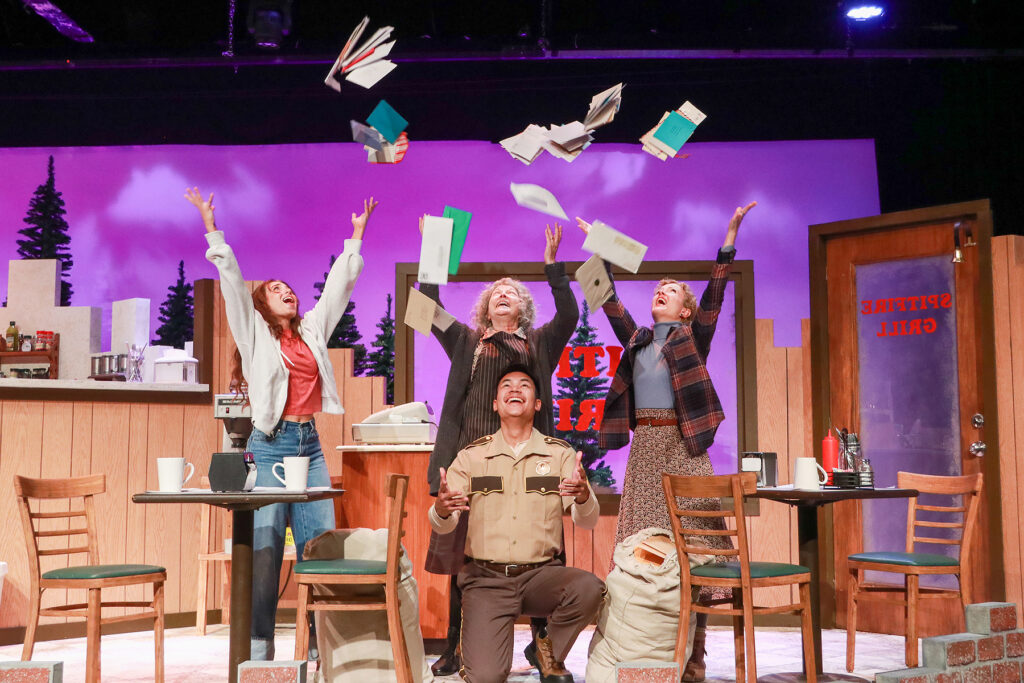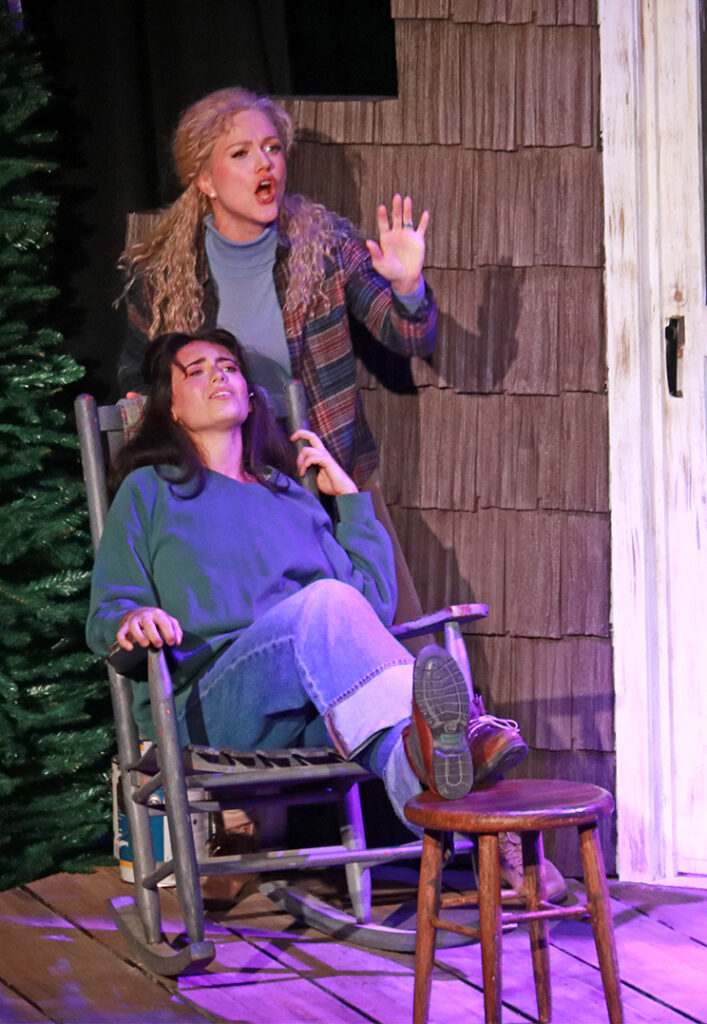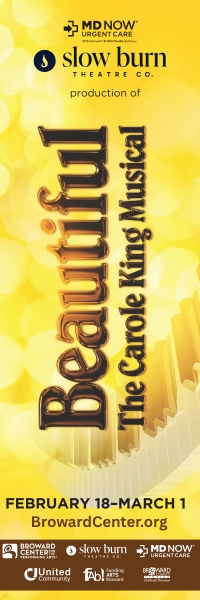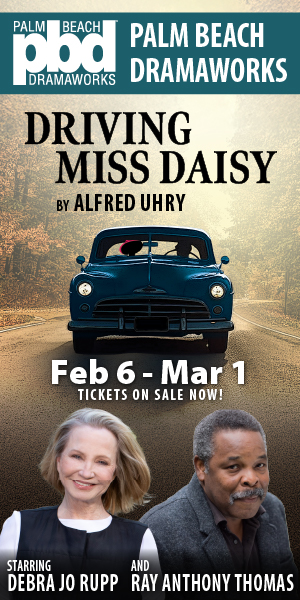
Emily Van Vliet Perea, Laura Turnbull, Nate Promkul and Kimberly Doreen Burns in The Spitfire Grill at Actors’ Playhouse at the Miracle Theatre. Photo by Alberto Romeu
By Bill Hirschman
Joy.
Manufactured joy is common in slam-bang upbeat musicals aimed primarily at entertainment.
But profound joy, infectious joy, genuine joy emerging out of prosaic life, out of darkness, out of life-scraped people, that joy in musical theater is rare and precious.
And arguably nowhere can audiences mesh with the expert evocation of joy and hope better than in Actors’ Playhouse’s glorious The Spitfire Grill.
Its creators underline the word redemption as a primary theme, but it is even more resurrection and rebirth as we watch flawed, troubled, yearning characters credibly ripen before your eyes.
Less proficient artists fail to chart such step by step fruition believably in most theater pieces let alone in musicals. But here we see rusted armor erode bit by bit until lifeforce blooms.
The premise: Young woman Percy Talbot (Emily Van Vliet Perea) leaves prison on parole after a five-year sentence, gingerly seeking a new start. In the depth of a frigid winter, she heads to the tiny “one-dog” town of Gilead, Wisconsin, idly lured by a random travelogue photo of a woodsy fall scene by its river. The young sheriff Joe (Nate Promkul) hooks her up as the sole employee at the only eating establishment in a burg atrophied when a highway was rerouted and the local quarry closed.
The acerbic guarded Percy is the ultimate outsider in a close-knit town in which everyone knows everyone very, very well. But some have carefully hidden secrets.
Among the denizens are Hannah (Laura Turnbull), a flinty curmudgeon who owns the diner; her nephew Caleb (Jim Ballard) who hates his dormant real estate job after being a successful foreman in the quarry; his abused wife Shelby (Kimberly Doreen Burns), a kind but submissive mouse; Effy (Heather Jan Rolff) the town gossip and postmistress, plus a mysterious mute stranger in the woods (Tom Wahl). Despite their sometimes prickly relationships, they form a close community that does not welcome strangers with open arms.
Everyone has a past which has cauterized their life, leaving each with unspoken dreams and yearnings for, at best, a better life and at a minimum, a separate peace. Most characters express these in private introspective songs wrenched out of their shuttered hearts.
Exemplary is when the melody, lyrics and Burns’ voice fuse as Shelby remembers the town’s heartbreak and loss when a cherished, inspiring son did not come back from Vietnam.
When hope goes, sidewalks crack
Whitewash fades. music stops
Empty streets, no parades
When hope goes, fences sag
Flagpoles rust. paint peels,
Broken wheels gather dust
When hope goes, hearts close
But there are group community numbers often tied to the play’s depiction of the seasons changing in a world where nature is an unheralded but integral part of the fabric.
The script is so tonally deft that the writers have ended the show not in the blossoming spring, but in the beauty of fall when winter is a few months away. Our protagonists have learned lessons they can take into the cold.
This might sound like a Hallmark greeting card and in lesser hands it might come across that way. But not here.
The title might be familiar from the 1996 source film. But the 2001 musical (which ends more positively) written by Fred Alley and James Valcq premiered in New Jersey, then moved to Playwrights Horizons Theater in New York where it was acclaimed by critics but did not draw as well over five weeks and never played Broadway.
But it generated a loyal fanbase, and true to its themes, it caught on across the country and then the world. Florida Stage mounted it the next year in 2002. Palm Beach Dramaworks lovingly gifted it in a rave-worthy production in 2019.
While it reportedly has had 700-plus productions around the world in professional regional, children and community theaters, there is a distinct danger that the sentiments could be flattened by amateurs. It takes skill and commitment exemplified by these artists as unified and guided by director David Arisco. Arisco and the company forge that sense of a full integrated community when there are only seven characters.
Music Director Nick Guerrero is equally effective in creating the aural milieu that reflects both the characters’ inner struggles as well as the rural environs.
The cast are at the top of their game actors who mine these characters’ underlying currents. But the asterisk is reserved for their universally soaring interweaving voices – every single last one lifting the audience. This is the real gift of the evening.
Perea, a veteran from Maltz Jupiter Theare shows, grabs the core of the evening as her voice captures Percy’s rough edged exterior concealing anguish. Her colleagues are just as superb. Especially notable are Turnbull whose vocal tone changes as her character changes, and Ballard whose muscular sound embodies the profound frustration and disappointment inside his Caleb.
But special mention is earned twice over by Burns who memorably starred in this company’s Bright Star in 2023. Her silver impassioned voice elevates Valqc’s impassioned melody and Alley’s lyrics such as when she comforts a shattered Percy with the song “Wild Bird.”
To the only wild bird
’Neath the northern sky.
Fold your tired wings awhile,
You will wake to fly…
Wild bird
Dream a dream of lifting up
From this hollow tree.
Fly a circle ’round the sun,
High above the sea.
When you reach the farther shore
Then you will be free…
The score echoes hill country music mixed with bluegrass and Broadway, but it encompasses heartfelt arias, toe-tapping celebrations and considerable mood-setting underscoring. Guerrero has not only guided these vocal performances, but he leads Alvaro Bermudez on guitar/mandolin, Tatiana Semichastnova with accordion, Tony Seepersad on fiddle/violin and Marcel Krasner with a cello.
Nods are deserved for Brandon M. Newton’s creation of the rural landscape, Eric Nelson’s lighting, Ellis Tillman’s costumes, Naomi Zapata’s stage management, Carlos Correa’s technical direction and crystal balanced sound by Reidar Sorensen.
The Spitfire Grill is the kind of evening that makes you grateful that theater exists.
The Spitfire Grill runs through Nov. 2 at Actors’ Playhouse at the Miracle Theatre, 280 Miracle Mile, Coral Gables. Ticket prices are from $45-$100 (10 percent discount for seniors on weekdays and $15 student rush tickets available 15 minutes prior to curtain). Performances are Wednesdays through Saturdays at 8 p.m. and Sundays at 3 p.m. and Wednesdays at 2 p.m. Running time two hours plus one intermission. For more information, call 305-444-9293 or visit www.ActorsPlayhouse.org or Actors’ Playhouse Box Office.

Emily Van Vliet Perea,’s Percy is comforted by Kimberly Doreen Burns














 A PaperStreet Web Design
A PaperStreet Web Design
